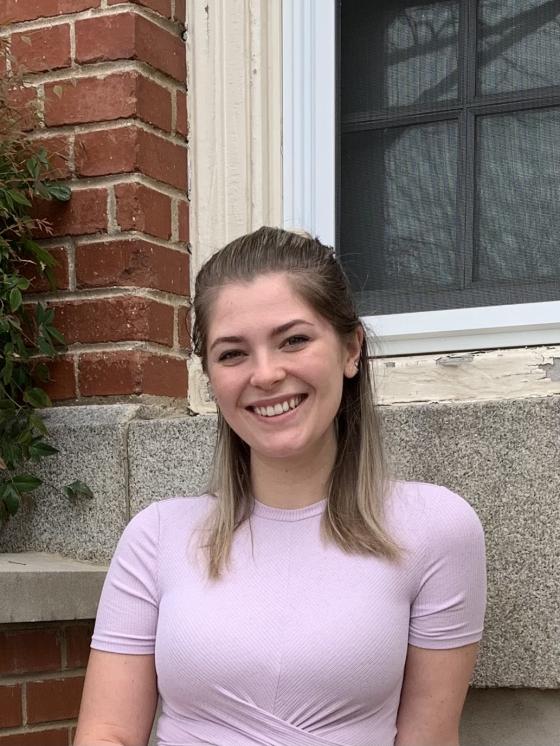
Sarah Buckley
Honors student uses X-credit to blog about food waste.
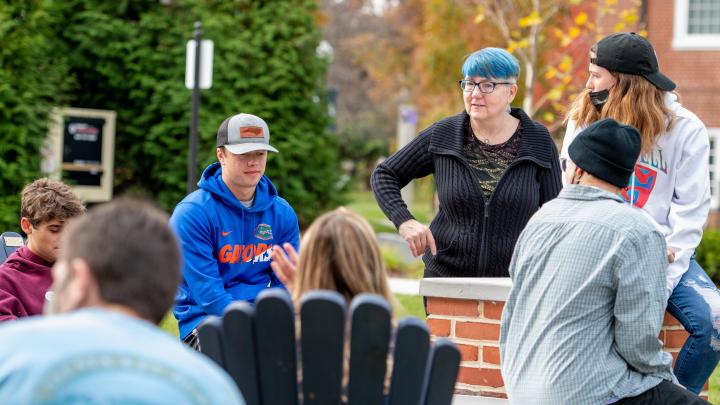
The Honors Program is meant to enrich your college experience rather than piling on extra work. To that end, we have designed a curriculum that allows you exemptions from certain core classes in exchange for completing levels of Honors coursework.
You also have flexibility in fulfilling upper lever Honors requirements—Honors electives, study abroad, writing a departmental honors paper or honors thesis—all of these qualify for Honors credit.
Honors classes are enhanced by field trips, guest speakers and a variety of hands-on activities and special projects. In keeping with the collaborative nature of the program, students meet as a group to decide on the topics of their senior seminars and suggest faculty they would like to teach them.
HON102-01 Movie Magic: Science in the Cinema; TTH 11:25AM-12:50PM
Instructor: Dr. Steven Clark
Prerequisite: FYS 101H.
Action heroes, car races, explosions, and truths that are more unbelievable than fiction– science is everywhere in the movies. Sometimes it is right; other times, they couldn’t be further from the truth. In this course, we will explore how science is portrayed in cinema from the special effects to the characters, how these portrayals influence our perception of the world, and at times, poke fun at some of the most blatant errors. Come learn whether it is “Science Fact” or just “Movie Magic,” and yes, some of your homework will be to watch movies!
HON102-02 The Human Mind; MW 11:30AM-12:55PM
Instructor: Dr. Sangeeta Gupta
Prerequisite: FYS 101H.
Welcome to "The Human Mind," an honors seminar class that explores the complex intersection of topics such as neuroscience, philosophy, psychology and art. Through a combination of discussions, debates, readings, critical thinking activities, and field trips, you will gain an understanding of and an appreciation for the mysteries and complexities of the mind. In this class, we will be using Paul Bloom’s compelling book, “The Story of the Human Mind” as a starting point, but YOU will determine the course's trajectory and shape the connections that we draw, ensuring that the topics we explore resonate with your own curiosity and passions. Ultimately, your interests will guide us through the fascinating landscape of the human mind. And you will hopefully leave with more questions than answers, igniting your curiosity and driving your pursuit of knowledge.
HON102-03: Cultivating Sustainability; TTH 11:25AM- 12:55PM
Instructor: Prof. Katie Huy
Prerequisite: FYS 101H.
Through engagement with a variety of experiential learning, guest speakers, literature and media resources, this course provides students opportunities to explore the foundations of conflict and the role conflict plays in understandings the intersection of natural and social systems. By understanding theoretical implications of social and natural systems intersection, students will examine past environmental conflict to address current conflict and decision-making processes. This course should increase students’ understanding of the significance of conflict in how it has shaped natural and social systems. We will use the ecological dialogue to consider the interplay of materialism, idealism and the practice that makes the other "true". By the end of this course students will be empowered to create their role in problem-solving strategies as they relate to sustainability in socio-environmental issues.
HON102-04 Nature and Culture of Trees; TTH 11:25AM-12:50PM
Instructor: Dr. Scott Pincikowski
Prerequisite: FYS 101H.
Trees and culture go hand in hand. Trees have helped shaped human society and culture, and humans have shaped trees and forests, often in a negative way through overharvesting and deforestation. This course explores this relationship, focusing on the nature and culture of trees. Students will examine the ecology and nature of trees, the communities they build, and explore and analyze trees and forests in the cultural imagination by looking at different examples in art, literature, and film, and in history and society, by looking at the fundamental role trees and forests play in the development of human communities and values. Students will become “tree literate” by the end of the class, finding what trees in nature and culture ultimately say about ourselves when we make the effort to understand them.
HON202: Practicum; TTR 11:25AM-12:50PM
Instructors: Dr. Jolene Sanders and Prof. Nina Carr
Prerequisite: HON 201
In this course, students design and participate in a service-learning project that addresses a social or intellectual problem of the student’s choice, includes an experiential and a research component and makes a positive contribution to the local community. Each student makes a culminating presentation of her/his experience and research.
HON312 Revisioning Motherhood in Modern Western Culture; TTR 3:35PM-5:00PM
Instructor: Dr. Lisa Algazi Marcus
Prerequisite: Open to sophomores, juniors and seniors in the Honors Program, or with permission of the instructor
An interdisciplinary study of the institution of motherhood and its representations in modern cultural productions of the Western world. Students will examine the myth and reality of mothering by analyzing readings in social, political and psychoanalytical theory as well literary and filmic texts. This course may be used for credit in the women’s studies minor.
HON 329/PHIL 319: Biomedical Ethics; TTR 11:25AM-12:50PM
Instructor: Prof. Danielle Albrecht
Prerequisites: One course from the Scientific Thought section of the Core.
This course takes a philosophical and scientific approach to understanding current ethical issues in medicine and covers topics such as abortion, euthanasia, genetic engineering, genetic testing, informed consent, organ transplantation and experimentation with human subjects.
HON397F: The Humanity of Inhuman Behavior; MW 2:40PM-4:05PM
Instructor: Dr. Jessica McManus
Prerequisites: Completion of Social/Behavioral section of the Core.
This class will explore the psychological mechanisms that explain why “normal” people engage in amoral or inhumane behaviors. Through the lens of social cognitive theory and moral disengagement models, we will navigate the mechanisms that lead to moral disengagement in a variety of contexts such as the entertainment industry, the corporate world, terrorism, and environmental sustainability. Emphasis will be placed on understanding the mechanisms of inhumane behavior and creating environments that encourage humane behavior.
HON397I: Humans, Animals & Society; TTH 2:00PM-3:20PM
Instructor: Prof. Nina Carr
Prerequisites: Completion of Philosophical Inquiry section of the Core.
This course explores the relationship and interaction between human and non-human animals in modern society with an emphasis on the United States. Through readings, lectures, and guest presentations, students will critically examine the nature of these relationships, how and why they are constructed, and the resulting distribution of benefits and burdens. Students will consider implications for individuals, communities, and society, including current approaches to reimagining the status quo. The course will highlight interdisciplinary perspectives including but not limited to social, psychological, ethical, legal, economic, political, public health, environmental, and technological.
HON397: Sports Washing; TTR 11:25am-12:50pm
Instructor: Dr. Alan Goldenbach
Prerequisites: Completion of Social/Behavioral section of the Core.
Sportswashing is a form of propaganda, capable of being executed by governments and political regimes as well as corporations or other large social institutions. In short, sportswashing is a carefully executed public relations campaign, designed to burnish or repair an image. This course will examine how sportswashing has been used through a variety of examples, including Nazi Germany’s hosting of the 1936 Summer Olympics and the National Football League’s efforts to minimize the long-term effects of concussions on its former players or acts of domestic violence by active players.
HON 470: Classic Movie Mysteries; TTR 11:25PM-12:50PM
Instructor: Katherine Orloff
Prerequisite: Open to seniors in the Honors Program or juniors with permission. May not be repeated.
This course explores the genre of classic movie mysteries. We define something as classic when it stands the test of time, and no matter when it was released, how it still grips an audience, or fails to, and why. We’ll look at and analyze numerous film mysteries from several decades, and fit them into the cultural context of their times.
Students take two seminar classes, FYS 101H in the fall semester and HON 102 in the spring. In addition, most students start their language requirement in the first semester, depending on placement. Check with your advisor and the Honors directors for recommendations.
The fall Honors First-Year Seminar (August-December) is team-taught by professors from different disciplines. Students will acquire skills in critical thinking, writing, and speaking as well as general skills for success in college and in their future.
FALL 2024 topics
Click the titles below to learn more about each topic. Honors students may choose the topic that interests them most. History & the City and Arts & the City are team-taught, as are Local Lore and Legends and The Art of Wandering, so students will get to experience two related topics with two different professors. Your "home" professor will also be your academic adviser until you declare your major.
Recent field trips for the Honors fall seminar have included:
In the spring semester (January-May), students may choose one of four different sections of HON102. Each class focuses on a topic that takes an interdisciplinary approach to the sciences and technology in relation to society.
Some recent topics:
Recent field trips for the spring have included:
Students take two seminar classes, Hon 201 in the fall semester and Hon 202 in the spring. In addition, most students finish their language requirement (through the 202 level) in the second semester of their second year, depending on placement. Check with your advisor and the Honors directors for recommendations.
Students can choose from a menu of classes that focus on global issues and differing cultural perspectives for HON 201, the fall seminar. They will be encouraged to imagine the world from many points of view and challenged to examine how they think about and interact with the global community.
Sample classes:
Class field trips for HON 201 have included:
Students will work closely with a faculty advisor of their choice for the spring semester practicum. Each student chooses a social or intellectual problem to address, writes a research paper and works at an off-campus site, gaining experience and connections that may also lead to paid employment or help determine a future career. The broad, overarching theme of this class is social justice, but the sites students at which students have chosen to volunteer are many and varied.
Recent practicum sites have included:
Students choose upper-level honors electives from a wide array of options, many of which are based on student requests. Students may also elect to study abroad; sites chosen by Honors students include France, Spain, England, Ireland, Scotland, Germany, Italy, Mexico, Israel, Korea and New Zealand. Study abroad counts as one honors elective. Students who successfully complete a departmental honors paper also receive credit for one honors elective.
Sample Honors electives:
Class field trips for upper-level electives have included:
The senior seminar is a high point of the honors program, when students reflect on their experience in the Honors Program. Students choose a topic of broad interest and select a faculty member to teach the course. Sample seminar classes:
The Honors Program welcomes qualified transfer students. More information about the requirements for transfer students can be found in the Hood College Catalog. Requirements differ depending on the level of involvement a student had with Honors at their prior institution. Transfer students work closely with the Honors co-directors to identify which requirements of the Honors Program apply to them.
Transfer students may satisfy the Honors global language requirement in one of the following ways:
Complete one global language course and one of the following:
ANTH 302 Cultural Anthropology
ECON 304 International Political Economy
ECON 317 Economics of Development
GER 301 Berlin in the 20th Century
GLBS 301 Human Migrations: Refugees and IDPs
GLBS 345 Global Persp/Women, Power & Politics
HIST 347 The Indigenous World
HIST 356/357 Global Empires I/II
HON/PHIL 316 Perspectives in Global Health
MEST 300 Cultures of the Middle East
NUR 300 Global Learning Exp/Healthcare & Nursing
The Honors Program welcomes qualified early college students who have completed an AA, or equivalent, during their high school years. Students with 30 or more credits from International Baccalaureate (IB) programs may also qualify, with director approval.
Early college students must take the First Year Seminar in their first semester at Hood. Their progression through the Honors Program is as follows:
They are considered transfer students for the purpose of Honors Program language requirements, which means they may satisfy the global language requirement in one of the following ways:
Complete one global language course and one of the following:
ANTH 302 Cultural Anthropology
ECON 304 International Political Economy
ECON 317 Economics of Development
GER 301 Berlin in the 20th Century
GLBS 301 Human Migrations: Refugees and IDPs
GLBS 345 Global Persp/Women, Power & Politics
HIST 347 The Indigenous World
HIST 356/357 Global Empires I/II
HON/PHIL 316 Perspectives in Global Health
MEST 300 Cultures of the Middle East
NUR 300 Global Learning Exp/Healthcare & Nursing

Honors student uses X-credit to blog about food waste.
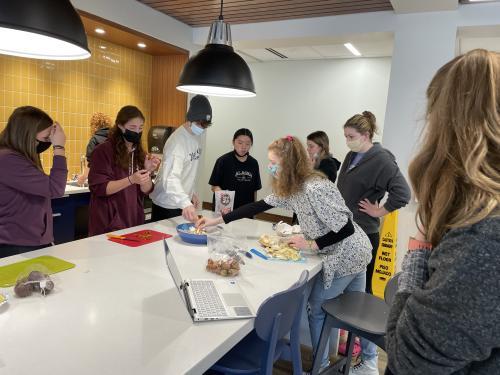
Honors 102 students sample fruits from other continents as they learn about sustainable diets!
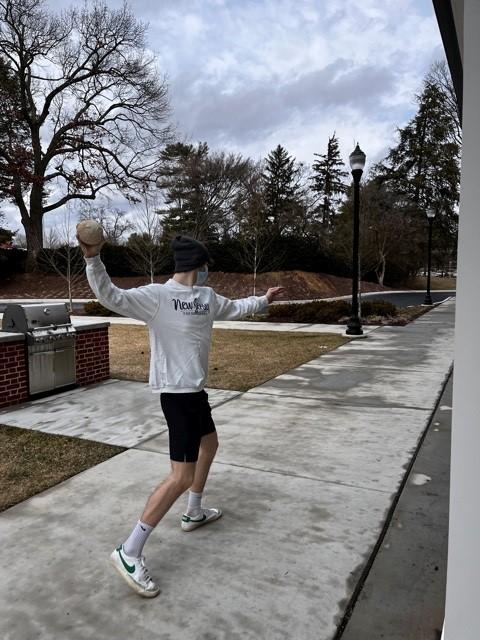
In the Sustainable Diet course, students explored foods from a variety of cultural traditions and parts of the world.
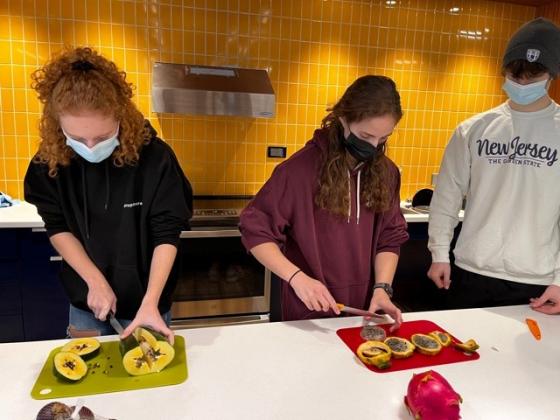
In the Sustainable Diet course, students explored foods from a variety of cultural traditions and parts of the world.
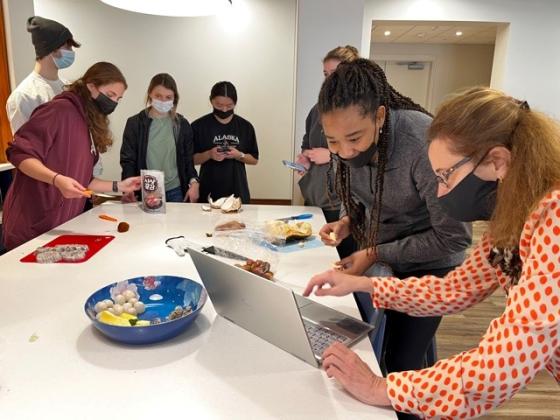
In the Sustainable Diet course, students explored foods from a variety of cultural traditions and parts of the world.
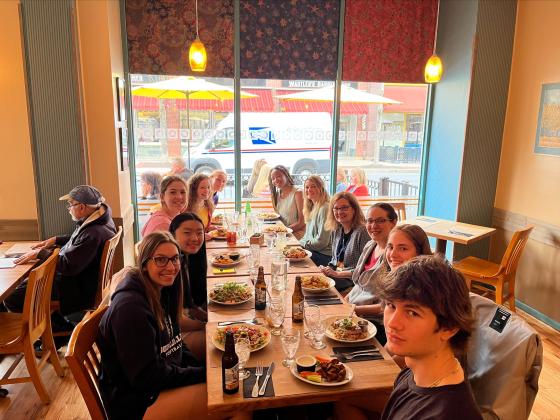
Honors class, The Sustainable Diet, evaluating the Orchard Restaurant downtown Frederick as a Farm to Fork restaurant with Gina Gohl from the Hood College Food Security Network.
Information will vary based on program level. Select a path to find the information you're looking for!